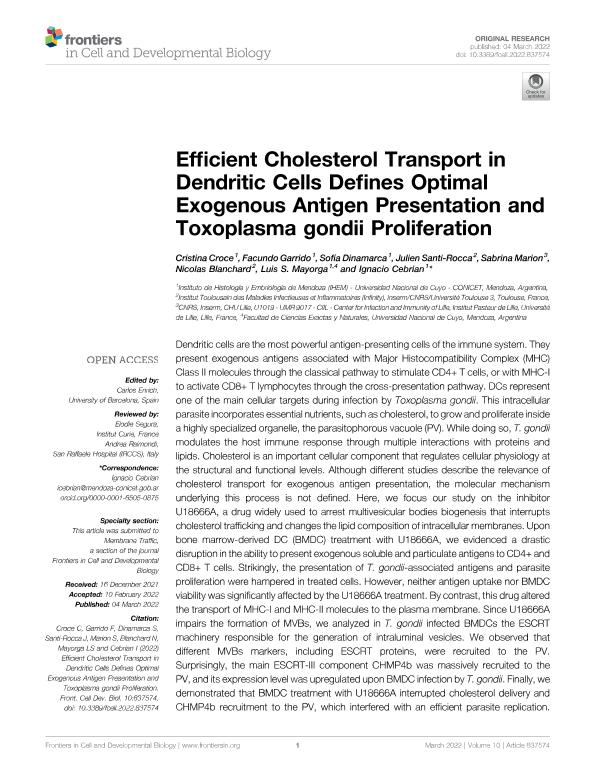Artículo
Efficient cholesterol transport in dendritic cells defines optimal exogenous antigen presentation and Toxoplasma gondii proliferation
Croce, Cristina Celeste ; Garrido, Facundo Matias
; Garrido, Facundo Matias ; Dinamarca, Sofía
; Dinamarca, Sofía ; Santi Rocca, Julien; Marion, Sabrina; Blanchard, Nicolas; Mayorga, Luis Segundo
; Santi Rocca, Julien; Marion, Sabrina; Blanchard, Nicolas; Mayorga, Luis Segundo ; Cebrián, José Ignacio
; Cebrián, José Ignacio
 ; Garrido, Facundo Matias
; Garrido, Facundo Matias ; Dinamarca, Sofía
; Dinamarca, Sofía ; Santi Rocca, Julien; Marion, Sabrina; Blanchard, Nicolas; Mayorga, Luis Segundo
; Santi Rocca, Julien; Marion, Sabrina; Blanchard, Nicolas; Mayorga, Luis Segundo ; Cebrián, José Ignacio
; Cebrián, José Ignacio
Fecha de publicación:
03/2022
Editorial:
Frontiers Media
Revista:
Frontiers in Cell and Developmental Biology
ISSN:
2296-634X
Idioma:
Inglés
Tipo de recurso:
Artículo publicado
Clasificación temática:
Resumen
Dendritic cells are the most powerful antigen-presenting cells of the immune system. They present exogenous antigens associated with Major Histocompatibility Complex (MHC) Class II molecules through the classical pathway to stimulate CD4+ T cells, or with MHC-I to activate CD8+ T lymphocytes through the cross-presentation pathway. DCs represent one of the main cellular targets during infection by Toxoplasma gondii. This intracellular parasite incorporates essential nutrients, such as cholesterol, to grow and proliferate inside a highly specialized organelle, the parasitophorous vacuole (PV). While doing so, T. gondii modulates the host immune response through multiple interactions with proteins and lipids. Cholesterol is an important cellular component that regulates cellular physiology at the structural and functional levels. Although different studies describe the relevance of cholesterol transport for exogenous antigen presentation, the molecular mechanism underlying this process is not defined. Here, we focus our study on the inhibitor U18666A, a drug widely used to arrest multivesicular bodies biogenesis that interrupts cholesterol trafficking and changes the lipid composition of intracellular membranes. Upon bone marrow-derived DC (BMDC) treatment with U18666A, we evidenced a drastic disruption in the ability to present exogenous soluble and particulate antigens to CD4+ and CD8+ T cells. Strikingly, the presentation of T. gondii-associated antigens and parasite proliferation were hampered in treated cells. However, neither antigen uptake nor BMDC viability was significantly affected by the U18666A treatment. By contrast, this drug altered the transport of MHC-I and MHC-II molecules to the plasma membrane. Since U18666A impairs the formation of MVBs, we analyzed in T. gondii infected BMDCs the ESCRT machinery responsible for the generation of intraluminal vesicles. We observed that different MVBs markers, including ESCRT proteins, were recruited to the PV. Surprisingly, the main ESCRT-III component CHMP4b was massively recruited to the PV, and its expression level was upregulated upon BMDC infection by T. gondii. Finally, we demonstrated that BMDC treatment with U18666A interrupted cholesterol delivery and CHMP4b recruitment to the PV, which interfered with an efficient parasite replication. Altogether, our results highlight the importance of cholesterol trafficking and MVBs formation in DCs for optimal antigen presentation and T. gondii proliferation.
Archivos asociados
Licencia
Identificadores
Colecciones
Articulos(IHEM)
Articulos de INST. HISTOLOGIA Y EMBRIOLOGIA DE MEND DR.M.BURGOS
Articulos de INST. HISTOLOGIA Y EMBRIOLOGIA DE MEND DR.M.BURGOS
Citación
Croce, Cristina Celeste; Garrido, Facundo Matias; Dinamarca, Sofía; Santi Rocca, Julien; Marion, Sabrina; et al.; Efficient cholesterol transport in dendritic cells defines optimal exogenous antigen presentation and Toxoplasma gondii proliferation; Frontiers Media; Frontiers in Cell and Developmental Biology; 10; 3-2022; 1-17
Compartir
Altmétricas



